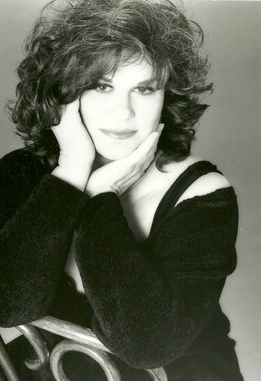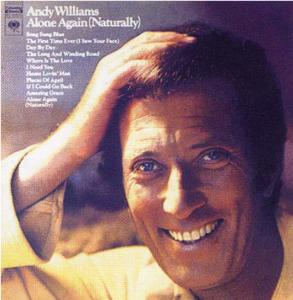Related Research Articles

"Misty" is a jazz standard written in 1954 by pianist Erroll Garner. He composed it as an instrumental in the traditional 32-bar format, and recorded it for the album Contrasts. Lyrics were added later by Johnny Burke. It appeared on Johnny Mathis' 1959 album Heavenly, and this recording reached number 12 on the U.S. Pop Singles chart later that year. It has since become the signature song of Mathis.
"Magic Moments" is a popular song with music by Burt Bacharach and lyrics by Hal David, one of the first compositions by that duo. The song was published in 1957. The song was recorded by Perry Como as the B-side of his "Catch a Falling Star". It reached No. 1 in the UK in 1958.
"My Heart Cries for You" is a popular song, adapted by Carl Sigman and Percy Faith from an 18th-century French melody.

"(They Long to Be) Close to You" is a song written by Burt Bacharach and Hal David. The best-known version is that recorded by American duo the Carpenters for their second studio album Close to You (1970) and produced by Jack Daugherty. Released on May 14, 1970, the single topped both the US Billboard Hot 100 and Adult Contemporary charts. It also reached the top of the Canadian and Australian charts and peaked at number six on the charts of both the UK and Ireland. The record was certified gold by the Recording Industry Association of America (RIAA) in August 1970.

"Smoke Gets in Your Eyes" is a show tune written by American composer Jerome Kern and lyricist Otto Harbach for the 1933 musical Roberta. The song was sung in the Broadway show by Tamara Drasin. Its first recorded performance was by Gertrude Niesen, who recorded the song with orchestral direction from Ray Sinatra, Frank Sinatra's second cousin, on October 13, 1933. Niesen's recording of the song was released by Victor, with the B-side, "Jealousy", featuring Isham Jones and his Orchestra.
"I'll Get By " is a popular song with music by Fred E. Ahlert and lyrics by Roy Turk. The song was published in 1928. Versions by Nick Lucas, Aileen Stanley and, most successfully, Ruth Etting, all charted in America in 1929.
"Make It Easy on Yourself" is a popular song written by Burt Bacharach and Hal David which was first a hit for Jerry Butler in 1962. The best known version is the 1965 recording by the Walker Brothers for whom it was a No. 1 UK hit. Dionne Warwick, who made a demo of this song in early 1962, later had a hit with the song in 1970.

American country music artist Patty Loveless has released 16 studio albums, 11 compilation albums, two video albums and 52 singles. Recording a tape of her own music, Loveless signed her first recording contract with MCA Records in 1985. Her self-titled studio album was released in January 1987 and peaked at number 35 on the Billboard Top Country Albums chart. She followed it with her second studio release, If My Heart Had Windows (1988). It peaked at number 33 on the country albums list and spawned her first major country hits: "If My Heart Had Windows" and "A Little Bit in Love". Her third studio album, Honky Tonk Angel (1988), would certify platinum by the Recording Industry Association of America and produced her first number one country hits, "Timber, I'm Falling in Love" and "Chains". Loveless went on to release the studio albums On Down the Line (1990) and Up Against My Heart (1991). Together, both albums produced three top 10 singles including the number three hit "Hurt Me Bad ".

The discography of American country singer Jessi Colter consists of eleven studio albums, three compilation albums, twenty six singles, fourteen other appearances, and one other charted song. After marrying guitarist Duane Eddy in 1961, Colter recorded two singles and toured with Eddy until divorcing in 1968. The following year, she met country artist Waylon Jennings who helped her secure a recording contract with RCA Victor. Her debut studio album entitled A Country Star Is Born was released in 1970. The pair would collaborate on a cover of Elvis Presley's "Suspicious Minds during this time. Colter signed with Capitol Records in 1975 and released her debut single off the label "I'm Not Lisa". The song became her commercial breakthrough, reaching the number one position on the Billboard Hot Country Singles chart and crossing over to the Billboard Hot 100 where it reached the top five. That same year, Colter's second studio album I'm Jessi Colter was issued, which also produce the Top five country hit, "What's Happened to Blue Eyes." In 1976, Colter released two more studio albums: Jessi and Diamond in the Rough.

The discography of American country music singer Marty Robbins consists of 52 studio albums, 13 compilation albums, and 100 singles. In his career, Robbins has charted 17 Number One singles on the Billboard Hot Country Songs charts, as well as 82 Top 40 singles.

The discography of American country music singer-songwriter K. T. Oslin contains six studio albums, six compilation albums, one video album, seven music videos, 25 singles and six album appearances. Oslin signed a recording contract with Elektra Records in 1981. Both singles failed to become major hits. She then signed with RCA Records in 1987 and released the single "80's Ladies." The song became a top ten country hit, reaching number seven on the Billboard Hot Country Songs chart in July 1987. Oslin's corresponding debut studio album of the same name reached number one on the Billboard Top Country Albums chart and spent 148 weeks on the list. It would also be her highest-charting album on the Billboard 200, peaking at number 68. The album would sell one million copies and spawn the number one hits "Do Ya" and "I'll Always Come Back." Oslin's second album, This Woman was released in 1988 and was her second record to certify platinum in sales. It was her second-highest charting album on the country chart, reaching number two in 1989. Its second single, "Hold Me," topped the country songs chart in January 1989. The album also spawned the top ten hits "Hey Bobby" and the title track.
Bernie Knee was an actor and singer/musician. While his birth name was Bernard Knee, most music industry magazines spelled his name Bernie Nee, which was also how his name was spelled on most of the recordings he issued during the 1950s. Knee was born and raised in the Bronx, the son of Louis and Celia Knee. He was a 1948 graduate of New York University, and became interested in performing while serving in the Navy during World War II. A versatile musician, he played guitar, piano and bass in addition to being a vocalist. He performed at some of New York's biggest clubs, including the Copacabana, the Riverboat, and Michael's Pub. In addition, he became known as an accomplished demo singer who made more than 5,000 demo recordings for songwriters in many genres. His biggest top-40 hit was one where his name did not appear: he was in a studio group called the Five Blobs. This band was assembled in Los Angeles, California for the express purpose of recording "The Blob", the title song for the Steve McQueen film The Blob. Written by Burt Bacharach and Mack David, the tune featured a prominent saxophone part. The single was released on Columbia Records and became a hit, peaking at No. 33 on the Billboard Hot 100 in November 1958. It also hit the Top Ten on the regional LA charts. The single's B side consisted of a song entitled "Saturday Night in Tiajuana" [sic] credited to Bacharach.

Heavenly is an album by American pop singer Johnny Mathis that was released on August 10, 1959, by Columbia Records and marked his return to recording ballads with orchestral accompaniment. Along with the material that others had covered before are two new songs: the title track and "I'll Be Easy to Find".

The Andy Williams Show is the twenty-sixth studio album by American pop singer Andy Williams that was released in the fall of 1970 by Columbia Records. In his review on AllMusic.com, William Ruhlmann writes that "The Andy Williams Show LP was not a soundtrack recording from the TV series, and it was not really a live album, although it gets categorized as such. What appears to be the case is that Columbia Records took a group of Williams' studio recordings, most of them made during the summer of 1970 and consisting of his versions of recent soft rock hits, and added a lot of canned applause along with some of the kind of musical interludes used to usher numbers on and off on the show, including bits of its "Moon River" theme music at the start and the finish."
"Rose Garden" is a song written in 1967 by American singer-songwriter Joe South. It was first recorded by Billy Joe Royal on his 1967 studio album Billy Joe Royal Featuring "Hush". Versions by South himself and Dobie Gray appeared shortly after the original. Gray's version became a minor hit in North America in 1969.

Love Story is an album by American pop singer Johnny Mathis that was released on February 10, 1971, by Columbia Records and included a recent Oscar nominee, a flashback to 1967 ("Traces"), a new song by Bacharach & David, a lesser-known one by Goffin & King, and two songs that originated in film scores from 1970 and had lyrics added later: the album closer, "Loss of Love", from Sunflower and the album opener from Love Story, which was subtitled "Where Do I Begin". The norm for Mathis projects from this era was to cover recent hits, and the title track of this one was so recent that the version by Andy Williams began a 13-week run to number nine on Billboard magazine's Hot 100 chart in February 1971, coinciding with the release of this LP.

Alone Again (Naturally) is the thirtieth studio album by American pop singer Andy Williams, released in September 1972 by Columbia Records and mainly consisting of songs originated by other artists. For its release in the UK, the album was titled The First Time Ever , and three of the songs were replaced with the 7-inch single tracks "Who Was It?" and "Marmalade, Molasses & Honey" and a recording that was not released on vinyl in the U.S., "If You're Gonna Break Another Heart".
"Trains and Boats and Planes" is a song written by composer Burt Bacharach and lyricist Hal David. Hit versions were recorded by Bacharach himself in 1965, by Billy J. Kramer and the Dakotas in the same year, and by Dionne Warwick in 1966.
The discography of American country artist Ashley Monroe consists of five full-length studio albums, two extended plays, nine singles, seven other appearances, and seven music videos. Following the death of her father in 2000, Monroe moved to Nashville, Tennessee as a teenager to pursue a music career. In 2006 and at age nineteen, she signed a contract with Columbia Records. She collaborated with producer Mark Wright on her debut studio album and released an advanced single in 2006 called "Satisfied". The song became a minor hit, only reaching the forty-third position on Billboard's Hot Country Songs chart. A second single "I Don't Want To" reached the top forty. Columbia failed to release her album until a top-twenty hit was created from the project. Meanwhile, advanced CD copies were briefly distributed. Monroe was eventually dropped from the label in 2007. However, it was eventually released as a digital download in 2009.

The singles discography of American country music artist Lynn Anderson contains 72 singles, three promotional singles, one charting B-side, two music videos and nine other song appearances. She signed her first recording contract with Chart Records in 1966. The following year, her single "Ride, Ride, Ride" debuted on the Billboard Hot Country Singles chart. Also in 1967, her single "If I Kiss You " became her first major hit when it reached number five on the country singles chart. Anderson had a series of hits that reached the top ten and 20 during the 1960s including "Promises, Promises" (1969), "No Another Time" (1968), "Big Girls Don't Cry" (1968) and "That's a No No" (1969).
References
- ↑ "The Hot 100 Chart". Billboard.
- ↑ The Blob discography, Allmusic
- ↑ "A Great New Star on the Horizon," Billboard, October 6, 1958, p. 44
- ↑ "45 Discography for Joy Records". www.globaldogproductions.info.